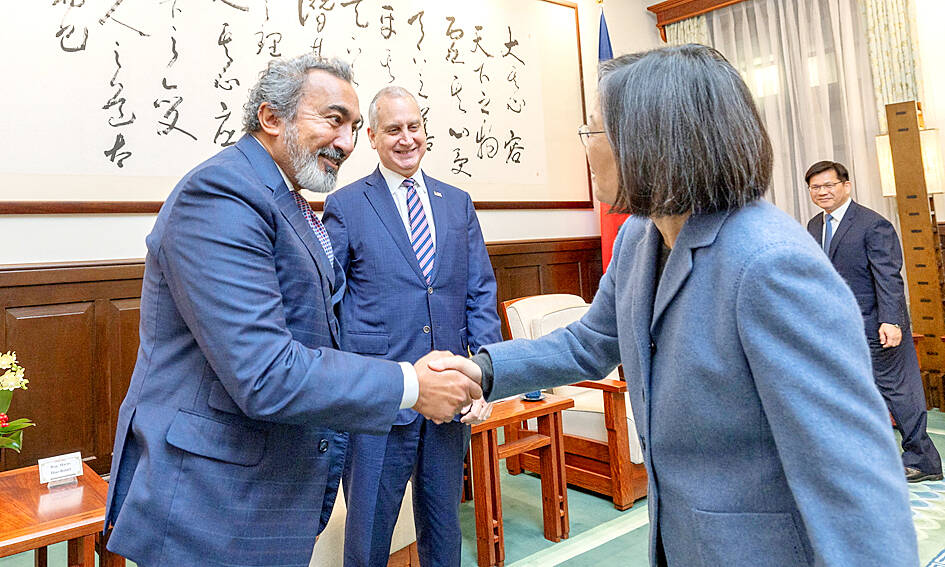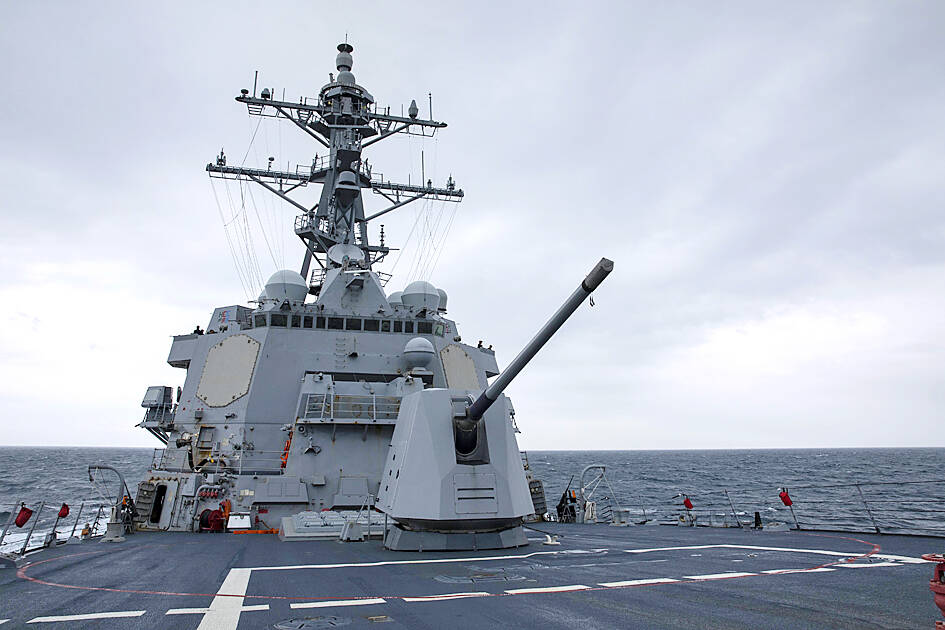A visiting US lawmaker yesterday expressed confidence that US support for Taiwan would remain strong regardless of the result of the US presidential and congressional elections in November.
US representatives Mario Diaz-Balart and Ami Bera, cochairs of the US Congressional Taiwan Caucus, are in Taiwan for a three-day visit to show solidarity with the nation and strengthen ties between Washington and Taipei.
The strong bipartisan understanding and support for Taiwan in the US Congress “will remain regardless of who is in the White House,” Diaz-Balart said. “That’s reflected by us being here today.”

Photo: Presidential Office via Reuters
Before the inauguration of Taiwan’s new president in May, Beijing is expected to “do some things,” Bera said.
“My message to Beijing is: Don’t do that. Let’s take a different path forward to maintain the status quo to maintain peace and prosperity in the region,” he added.
The US and its allies in the region are not seeking conflict, but peace and prosperity, he said.

Photo: US Navy via AP
Taiwanese exercising their right to vote and choose their own future is “nothing provocative,” he added.
The delegation is sending a message to the world that the US continues to stand with Taiwan and pressure or coercion would not be tolerated, Diaz-Balart said.
“The people of Taiwan again, once again, leading and showing what democracy looks like. And that’s a threat to the Communist Party of China, but so be it,” he said.
During their meeting with President Tsai Ing-wen (蔡英文) earlier yesterday, Diaz-Balart said that US lawmakers are well aware of the Chinese intervention in Taiwan’s elections and the “dramatic contrast” between China and Taiwan, which he called a “shining star of freedom, of prosperity, of democracy.”
The US Congressional Taiwan Caucus — which is led by four bipartisan cochairs including Republican Diaz-Balart and Democrat Bera — being the biggest caucus in the US Congress demonstrates the US people’s firm support for Taiwanese, Bera said.
It is not the people in the US or Taiwan who choose to alter the “status quo,” he said, adding that “it is incumbent upon us, as democracies, as people who believe in freedom, to address those aggressions” from China.
As this year marks the 45th anniversary of the promulgation of the Taiwan Relations Act, its core principle — Taiwanese should be able to choose their own path forward and their own future — is to “stay steadfast and true,” he said.
Tsai thanked the two lawmakers for visiting Taiwan to show their support and the caucus for releasing a statement to congratulate Taiwan on the success of its democratic elections on Jan. 13.
The caucus has played a particularly vital role in deepening economic and trade relations between Taiwan and the US, such as calling on Washington to negotiate a free-trade agreement with Taipei and including Taiwan in the Indo-Pacific Economic Framework for Prosperity, she said.
Tsai added that she hoped the issue of double taxation between the two sides could be resolved soon.
Taiwan is to continue to move forward on its democratic path, she said, adding that the nation’s cooperation with the US and other countries would strengthen the democratic camp and create global prosperity.
In a separate meeting with president-elect Vice President William Lai (賴清德) yesterday, Bera said that the administrative and legislative branches of the US government and its people are to continue working with Taiwan to ensure regional peace and prosperity.
Democracy, freedom and human rights are the most valuable assets of Taiwan and the core values it shares with the US, Lai said.
Lai added that he hoped the US Congress would continue to support Taiwan in strengthening its self-defense capabilities, which would help further enhance the Taiwan-US partnership, and drive regional and global prosperity and development.
In other news, Arleigh Burke-class destroyer the USS John Finn transited the Taiwan Strait on Wednesday, the US Navy said.
In a statement, the US 7th Fleet said the John Finn’s transit “demonstrates the United States’ commitment to upholding freedom of navigation for all nations as a principle.”
“The ship transited through a corridor in the Strait that is beyond the territorial sea of any coastal state,” the 7th Fleet said.
The Ministry of National Defense confirmed that a southbound US Navy ship had passed through the Taiwan Strait.
The ministry said it was closely monitoring the waters and airspace around the Taiwan Strait as the ship was making the transit, and nothing unusual was observed.
Additional reporting by CNA

NEXT GENERATION: The four plants in the Central Taiwan Science Park, designated Fab 25, would consist of four 1.4-nanometer wafer manufacturing plants, TSMC said Taiwan Semiconductor Manufacturing Co (TSMC, 台積電) plans to begin construction of four new plants later this year, with the aim to officially launch production of 2-nanometer semiconductor wafers by late 2028, Central Taiwan Science Park Bureau director-general Hsu Maw-shin (許茂新) said. Hsu made the announcement at an event on Friday evening celebrating the Central Taiwan Science Park’s 22nd anniversary. The second phase of the park’s expansion would commence with the initial construction of water detention ponds and other structures aimed at soil and water conservation, Hsu said. TSMC has officially leased the land, with the Central Taiwan Science Park having handed over the

The Philippines is working behind the scenes to enhance its defensive cooperation with Taiwan, the Washington Post said in a report published on Monday. “It would be hiding from the obvious to say that Taiwan’s security will not affect us,” Philippine Secretary of National Defense Gilbert Teodoro Jr told the paper in an interview on Thursday last week. Although there has been no formal change to the Philippines’ diplomatic stance on recognizing Taiwan, Manila is increasingly concerned about Chinese encroachment in the South China Sea, the report said. The number of Chinese vessels in the seas around the Philippines, as well as Chinese

AUKUS: The Australian Ambassador to the US said his country is working with the Pentagon and he is confident that submarine issues will be resolved Australian Ambassador to the US Kevin Rudd on Friday said that if Taiwan were to fall to China’s occupation, it would unleash China’s military capacities and capabilities more broadly. He also said his country is working with the Pentagon on the US Department of Defense’s review of the AUKUS submarine project and is confident that all issues raised will be resolved. Rudd, who served as Australian prime minister from 2007 to 2010 and for three months in 2013, made the remarks at the Aspen Security Forum in Colorado and stressed the longstanding US-Australia alliance and his close relationship with the US Undersecretary

‘WORLD WAR III’: Republican Representative Marjorie Taylor Greene said the aid would inflame tensions, but her amendment was rejected 421 votes against six The US House of Representatives on Friday passed the Department of Defense Appropriations Act for fiscal 2026, which includes US$500 million for Taiwan. The bill, which totals US$831.5 billion in discretionary spending, passed in a 221-209 vote. According to the bill, the funds for Taiwan would be administered by the US Defense Security Cooperation Agency and would remain available through Sept. 30, 2027, for the Taiwan Security Cooperation Initiative. The legislation authorizes the US Secretary of Defense, with the agreement of the US Secretary of State, to use the funds to assist Taiwan in procuring defense articles and services, and military training. Republican Representative